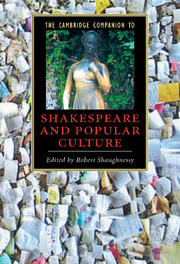Book contents
- Frontmatter
- Introduction
- 1 From popular entertainment to literature
- 2 Shakespeare abbreviated
- 3 Shakespearean stars: stagings of desire
- 4 Shakespeare illustrated
- 5 Shakespeare: myth and biographical fiction
- 6 Narration and staging in Hamlet and its afternovels
- 7 Shakespeare serialized: An Age of Kings
- 8 Musical Shakespeares: attending to Ophelia, Juliet, and Desdemona
- 9 Shakespeare overheard: performances, adaptations, and citations on radio
- 10 Shakespeare on the tourist trail
- 11 Performing Shakespeare in digital culture
- 12 Shakespeare’s popular face: from the playbill to the poster
- Further reading
- Index
- Series List
7 - Shakespeare serialized: An Age of Kings
Published online by Cambridge University Press: 28 November 2008
- Frontmatter
- Introduction
- 1 From popular entertainment to literature
- 2 Shakespeare abbreviated
- 3 Shakespearean stars: stagings of desire
- 4 Shakespeare illustrated
- 5 Shakespeare: myth and biographical fiction
- 6 Narration and staging in Hamlet and its afternovels
- 7 Shakespeare serialized: An Age of Kings
- 8 Musical Shakespeares: attending to Ophelia, Juliet, and Desdemona
- 9 Shakespeare overheard: performances, adaptations, and citations on radio
- 10 Shakespeare on the tourist trail
- 11 Performing Shakespeare in digital culture
- 12 Shakespeare’s popular face: from the playbill to the poster
- Further reading
- Index
- Series List
Summary
Shakespeare has suffered the final indignity . . . Romeo and Juliet has been rewritten by a woman novelist as a serial in an American newspaper.
(Evening Standard, February 1937)Writing with exquisite scorn – that cluster of denigration in “woman,” “novelist,” “serial” and “American,” the implied bathos of the contrast between these lowbrow signifiers and “Shakespeare” – the Evening Standard's “Londoner” ridicules the idea that Shakespeare might be serialized, quoting the cliffhanger from the penultimate episode: “Will Friar John overtake Romeo on the road? Or will Romeo reach Juliet's tomb before he can be saved? Don't miss to-morrow's concluding chapter!” This short, snide review takes as a given the aesthetic mismatch between the commercial practices of serialization and the exalted cultural status of Shakespeare. In this chapter, however, I want to start from a different premise in order to engage with the question and practice of Shakespearean serialization, juxtaposing eight of the plays based on medieval English history written by Shakespeare during the 1590s with their publication in chronological sequence in the First Folio text of 1623, and their performance as a cycle or series during the twentieth century, in particular in the television series An Age of Kings broadcast by the BBC in 1960. What can the formal practices of the construction and consumption of television serialization tell us about original serial or cycle composition of the plays? Rather, therefore, than engaging with the television adaptation of Shakespeare as always and already parasitic and secondary, I want to invert the order of priority. By focusing on the specifically televisual aspects of An Age of Kings I hope to reveal something about the functions of serial narrative in Shakespeare's plays, as well as something about their adaptation onto the small screen.
- Type
- Chapter
- Information
- The Cambridge Companion to Shakespeare and Popular Culture , pp. 134 - 149Publisher: Cambridge University PressPrint publication year: 2007
- 5
- Cited by



